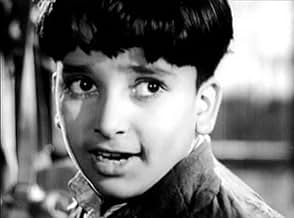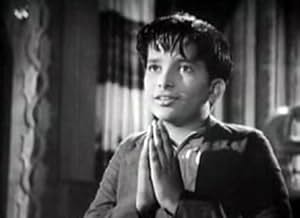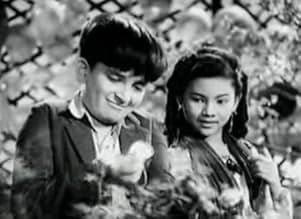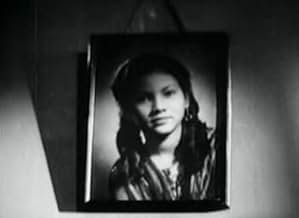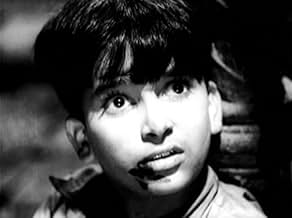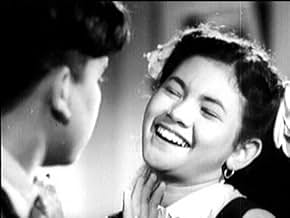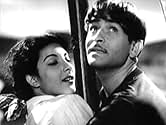AVALIAÇÃO DA IMDb
7,8/10
4,8 mil
SUA AVALIAÇÃO
Adicionar um enredo no seu idiomaA poor young man named Raj joins a criminal gang to feed his mother. But when he falls in love with Rita, he decides to reform himself for her.A poor young man named Raj joins a criminal gang to feed his mother. But when he falls in love with Rita, he decides to reform himself for her.A poor young man named Raj joins a criminal gang to feed his mother. But when he falls in love with Rita, he decides to reform himself for her.
- Prêmios
- 1 indicação no total
Prithviraj Kapoor
- Justice Raghunath
- (as Prithviraj)
Shashi Kapoor
- Young Raj
- (as Shashiraj)
Brij Mohan Vyas
- Dubey (Rita's Father)
- (as B.M. Vyas)
Leela Mishra
- Mr. Raghunath's Sister-In-Law
- (as Leela Misra)
Avaliações em destaque
When I was little, my grandmother often told me about a movie from her younger ages - Awaara /released as Bradyaga/. She was always telling me, that when it came to Bulgaria it was a total hit. People watched it more that 20 times! (especially the gypsies, who thought of Indian people as their ancestors). If I ask somebody, who is over 50 year old about that film, I am sure, that he will remember it. And when the main actor - Raj Kapoor visited the country, thousands of people traveled to see him. My grandma, who was one of the best portrait photographers at that time and was asked to make his pictures with the leaders of the country, remembers that he and his wife never acted like international movie stars. They met with ordinary people, visited hospitals and orphanages. Why was that film so special? Especially in Bulgaria - a country on a Balcan peninsula with such a different culture from India? First of all, it was so different from the Soviet films that were broad-casted at that time. It was full of life, passion, love, music, and nevertheless - it was a social film - about the problems of the different classes. And it made a country so far away close. It was the first step for the good relationships between our two countries. A few years ago I have the chance to watch this movie. And I can tell, its messages are still up to day. Something that you can tell for every really good film. Watch it, you will not regret it.
This is a classic Bollywood movie and seminal Raj Kapoor - Nargis vehicle, forcing home to the audience all manner of stereotypes, prejudices and assumptions before systematically dismantling them all with a sledgehammer. It was another of RK's successful and respectful attempts at mass entertainment mixed with mass education, generations later it's all so obvious that unfortunately we can lose sight of how much good it did at the time and just how well-intentioned it was.
I was watching the colourful Suraj a while ago and was reminded of old black and white Awara which I hadn't seen in decades – it's another take on once a bandit's son always a bandit's son; or, Blood vs Destiny. Delinquent wastrel and felon Raj is the kicked about son of a strict old-fashioned judge (played by Prithviraj) which neither of them realise, he and childhood friend Nargis who is now the judge's ward fall in love and, well, it spirals out of control for everyone. Is it Nature or is it Nurture that has made him a proud tramp? Some lovely noirish photography and atmospheric flashback scenes complement a melodramatic storyline, and there's even time for an admirable dream/nightmare sequence. It's a marvellous, if very contrived film with plenty of ideas, some tremendous images and great music by Shankar - Jaikishan as it is but as usual for me whenever the incomparable Lata sings it's turned into something even more special. Favourite bits: Nargis never looked lovelier or more iconic throughout but Aa Jao Tadapte Hain Arman with RK stroking her hair takes top prize; the literally dreamy and fascinating Tere Bina Aag Yeh Chandni; and RK does his anthem Awara Hoon too. According to Lata it took a whole night to record the music for the dream sequence.
So many sincere films made over the last 50 years have no morality, at the most charitable most don't even know the meaning of the word; so what's so bad about a film having too much? Nothing wrong at all with Good beating Evil! Imho, even though poverty still breeds crime while Our Betters still deny it, Raj Kapoor's finest film.
I was watching the colourful Suraj a while ago and was reminded of old black and white Awara which I hadn't seen in decades – it's another take on once a bandit's son always a bandit's son; or, Blood vs Destiny. Delinquent wastrel and felon Raj is the kicked about son of a strict old-fashioned judge (played by Prithviraj) which neither of them realise, he and childhood friend Nargis who is now the judge's ward fall in love and, well, it spirals out of control for everyone. Is it Nature or is it Nurture that has made him a proud tramp? Some lovely noirish photography and atmospheric flashback scenes complement a melodramatic storyline, and there's even time for an admirable dream/nightmare sequence. It's a marvellous, if very contrived film with plenty of ideas, some tremendous images and great music by Shankar - Jaikishan as it is but as usual for me whenever the incomparable Lata sings it's turned into something even more special. Favourite bits: Nargis never looked lovelier or more iconic throughout but Aa Jao Tadapte Hain Arman with RK stroking her hair takes top prize; the literally dreamy and fascinating Tere Bina Aag Yeh Chandni; and RK does his anthem Awara Hoon too. According to Lata it took a whole night to record the music for the dream sequence.
So many sincere films made over the last 50 years have no morality, at the most charitable most don't even know the meaning of the word; so what's so bad about a film having too much? Nothing wrong at all with Good beating Evil! Imho, even though poverty still breeds crime while Our Betters still deny it, Raj Kapoor's finest film.
I saw it as a kid, sometime in 1957 or 1958. I was marveled and for a long time the movie remained in my heart. I was humming the Awaara Hum all the time, I was imagining myself as Raj, I was thinking at Rita. I started to consider myself a grown up: after all also Raj started in the movie as a kid and became a grown up. I knew now his songs, I knew so all I needed to be a grown up.
Well, I was a kid; it seems that also grown ups were in love with Awara; someone told me of a respectable physician who had been seen hanging around and humming Awaara Hum.
And this was what was happening those times in Romania. And in Bulgaria. And in the Soviet Union. And in Turkey. Kids and grown ups were humming the songs, imagining themselves as Raj, unconditionally in love for Rita, kids considering themselves grown ups, grown ups behaving like kids.
The life of this movie was becoming a legend.
I watched again the movie, a couple of days ago, on TV. Of course it gave me an immense pleasure and I began (jokingly this time, while clearly happy) to sing Awaara Hum again.
Did I notice this time something that I had missed years ago? Well, this time I was able to examine the fascination conveyed by this movie, surrounding this movie. I was able to examine it, as I was now detached; long time ago I had been immersed in the fascinating universe of Awara.
I was able this time to observe that the fascination was not coming from the plot; it was from somewhere beyond. The actor playing the father of Raj was also in real life the father of Raj Kapoor. The same with the actor playing Raj as kid: he was the brother of Raj Kapoor. As for Nargis, the great actress playing Rita, she was in real life the great love of Raj Kapoor. And all the rest of the cast was infused with the chemistry among these guys: their reciprocal chemistry, their chemistry for the cinematic art.
I think at the secret of this movie: it has a secret, no doubt about. You see, in 1949 the Japanese Ozu had created Late Spring, followed by Early Summer in 1951, the same year Raj Kapoor created Awara; I consider Ozu one of the greatest masters of cinema; in 1956 the Indian Satyajit Ray would create Pather Panchali, which is maybe one of the most profound movies of all times; followed by Aparajito and then by The World of Apu. Well, Awara stands, courageously, in my preferences among the movies of these titans, and this because it has a secret of his own.
Many noted the Chaplinesque dimension of the tramp created by Raj Kapoor in Awara. And clearly Kapoor had Charlot in his mind: the same humorous courage to stand against all odds. But, it's not only Charlot in Awara; you feel there also the air of films noirs, while the romance, saturated with music, has a surrealist poetry.
And maybe here is where the secret lies: this movie was created with the pleasure for creating cinema; with the passion to succeed in bringing on the screen a perfectly popular movie. If you want to understand what Bollywood means, you should see this movie from 1951. A movie openly looking for popularity because made by someone in love for the people, someone loving to tell stories to enjoy the attendance. Awara has a clear social message, but, as someone has very well observed, it is not a popular movie made to convey the message, rather the opposite: the message serves to convey a popular movie.
Well, I was a kid; it seems that also grown ups were in love with Awara; someone told me of a respectable physician who had been seen hanging around and humming Awaara Hum.
And this was what was happening those times in Romania. And in Bulgaria. And in the Soviet Union. And in Turkey. Kids and grown ups were humming the songs, imagining themselves as Raj, unconditionally in love for Rita, kids considering themselves grown ups, grown ups behaving like kids.
The life of this movie was becoming a legend.
I watched again the movie, a couple of days ago, on TV. Of course it gave me an immense pleasure and I began (jokingly this time, while clearly happy) to sing Awaara Hum again.
Did I notice this time something that I had missed years ago? Well, this time I was able to examine the fascination conveyed by this movie, surrounding this movie. I was able to examine it, as I was now detached; long time ago I had been immersed in the fascinating universe of Awara.
I was able this time to observe that the fascination was not coming from the plot; it was from somewhere beyond. The actor playing the father of Raj was also in real life the father of Raj Kapoor. The same with the actor playing Raj as kid: he was the brother of Raj Kapoor. As for Nargis, the great actress playing Rita, she was in real life the great love of Raj Kapoor. And all the rest of the cast was infused with the chemistry among these guys: their reciprocal chemistry, their chemistry for the cinematic art.
I think at the secret of this movie: it has a secret, no doubt about. You see, in 1949 the Japanese Ozu had created Late Spring, followed by Early Summer in 1951, the same year Raj Kapoor created Awara; I consider Ozu one of the greatest masters of cinema; in 1956 the Indian Satyajit Ray would create Pather Panchali, which is maybe one of the most profound movies of all times; followed by Aparajito and then by The World of Apu. Well, Awara stands, courageously, in my preferences among the movies of these titans, and this because it has a secret of his own.
Many noted the Chaplinesque dimension of the tramp created by Raj Kapoor in Awara. And clearly Kapoor had Charlot in his mind: the same humorous courage to stand against all odds. But, it's not only Charlot in Awara; you feel there also the air of films noirs, while the romance, saturated with music, has a surrealist poetry.
And maybe here is where the secret lies: this movie was created with the pleasure for creating cinema; with the passion to succeed in bringing on the screen a perfectly popular movie. If you want to understand what Bollywood means, you should see this movie from 1951. A movie openly looking for popularity because made by someone in love for the people, someone loving to tell stories to enjoy the attendance. Awara has a clear social message, but, as someone has very well observed, it is not a popular movie made to convey the message, rather the opposite: the message serves to convey a popular movie.
in the East of Europe, under the Comunist regime, the Indian films have had a special status. as alternative to the Soviet movies and propaganda shows. but, in same measure, for the social message. clear . for romanticism and music and charm of actors and dramatic situations. but Awaara was more than a successful Indian film. it was, and remains, an epic. because it gives the right perspective about ordinary, every day situations. because it reminds the joy of life and the deep pain.because it is , like the childhood fairy tales, story of courage and self determination and love difficulties , sacrifice and happiness. because it is nice and bitter and translation in image of known situations. and, sure, for Raj Kapoor. in the East , the Indian film was an open window. Awaara was, for years, one of the most convincing examples.
I have always like watching movies. However, as time went by, I have only known of Hollywood, European, Japanese, and Filipino cinema.
When I learned that Awara is one of Time Magazine's Top 100, I got a copy. The movie called my attention because I haven't seen a Bollywood movie.
I watched Awara, and I was entertained. All the genre you can think of, you'll find it there. Name it: melodrama, action, comedy, romance, music, fantasy. Raj Kapoor craftily weaved them in the almost three hour-long classic.
Behind the melodrama is the social commentary. The conflict between a person versus the orthodox beliefs of the milieu is a recurring theme each of us face in everyday life. Pressures to adhere to the norm led the main character to his plight. Children growing up in squalid areas is an important issue tackled.
The musical sequences showed the movie's multi-faceted nature. It showed references to Chaplin, Rodgers/Hammerstein, and the like. Particularly amazing is the dream sequence in an east meets west setting. Elements of Hindu-Buddhist mythology are mingled with those of ancient Greco-Roman.
The eclectic experience solidified my belief that Bollywood is indeed a pillar of world cinema. I look forward to watching more.
When I learned that Awara is one of Time Magazine's Top 100, I got a copy. The movie called my attention because I haven't seen a Bollywood movie.
I watched Awara, and I was entertained. All the genre you can think of, you'll find it there. Name it: melodrama, action, comedy, romance, music, fantasy. Raj Kapoor craftily weaved them in the almost three hour-long classic.
Behind the melodrama is the social commentary. The conflict between a person versus the orthodox beliefs of the milieu is a recurring theme each of us face in everyday life. Pressures to adhere to the norm led the main character to his plight. Children growing up in squalid areas is an important issue tackled.
The musical sequences showed the movie's multi-faceted nature. It showed references to Chaplin, Rodgers/Hammerstein, and the like. Particularly amazing is the dream sequence in an east meets west setting. Elements of Hindu-Buddhist mythology are mingled with those of ancient Greco-Roman.
The eclectic experience solidified my belief that Bollywood is indeed a pillar of world cinema. I look forward to watching more.
Você sabia?
- CuriosidadesIn Awaara, there are three genaration of the Kapoor family in the film. There is Deewan Kapoor in the film, who was the grandfather of Raj Kapoor (father of pritviraj ) who plays the role of judge, who comes in the beggining of the film and in the end, then Raj Kapoor's father, Pritviraaj and also his young brother, Shashi Kapoor (junior raj kapoor ) were also in this film. As a filmaker this was Raj Kapoor, his third film. This film got very famous in Russia. In a outdoor scene of Raj with Nargis, in the background, the music of the song ' na mangu sona chandi' could be heard there, 20 years later this tune was used in a song of. Bobby.
- ConexõesFeatured in Century of Cinema: And the Show Goes On: Indian Chapter (1996)
- Trilhas sonorasAwara Hoon
Sung by Mukesh
Music composed by Shankarsingh Raghuwanshi and Jaikishan Dayabhai Panchal (as Shankar-Jaikishan)
Lyrics by Shailendra
Principais escolhas
Faça login para avaliar e ver a lista de recomendações personalizadas
- How long is Awaara?Fornecido pela Alexa
Detalhes
- Tempo de duração3 horas 13 minutos
- Cor
- Proporção
- 1.37 : 1
Contribua para esta página
Sugerir uma alteração ou adicionar conteúdo ausente



